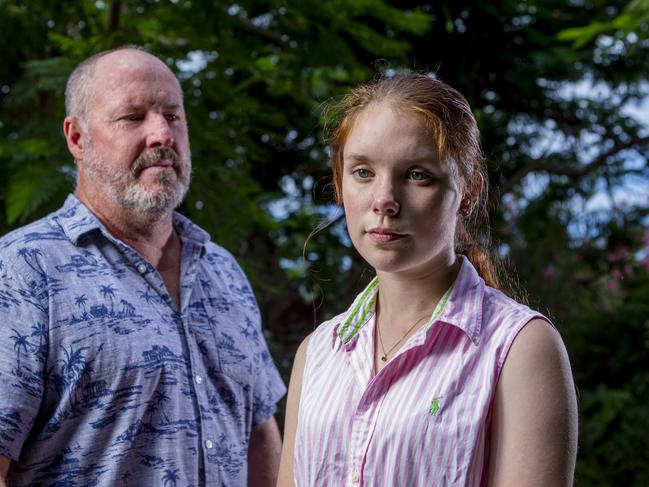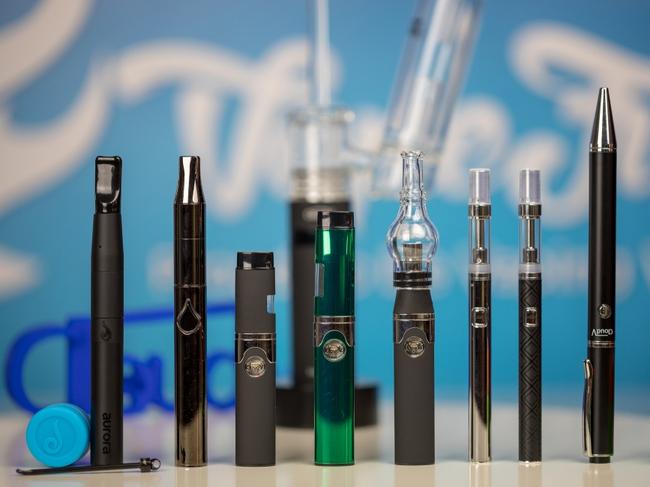School stress and mental health driving kids as young as 12 to vaping addiction
A high school graduate has revealed the multiple possible causes that lead to kids taking up the vaping, as she pleads for schools to pay more attention to struggling students following her own experience with addiction.
QLD News
Don't miss out on the headlines from QLD News. Followed categories will be added to My News.
Stress, school pressure and mental illness are driving vaping addictions in kids as young as 13, according to a recent high school graduate.
Eighteen-year-old Talyssa McMah said she has seen vaping in schools since she was in year seven and started vaping herself when she entered year 11.
“I’ve seen people getting addicted to it. Kids as young as 12 do it just to get to this euphoric state,” she said.
From her experience, the rise in vaping has been directly linked to growing school pressures and mental health issues where schools tend to turn a blind eye.
“The only reason it’s become such a major problem is because most students aren’t getting the mental health help they need from schools,” she said.
“Kids see their friends doing it and it’s normalised in their daily life, others use it to experiment.”

For Talyssa, vaping was a way of coping with everyday stress, and just recently following her graduation, she has found herself moving away from the habit.
“It’s more the environment that I was in that was the main problem,” she said.
“A lot of school kids are just looking to isolate themselves from school stress, and they do that with nicotine.”
Talyssa’s dad, Marcus Cryer, said he was shocked to find a vape in his daughter’s room.
“We have a really good relationship with her and she’s very mature for her age. It was really the first negative thing we’d seen from her,” he said.
But creating a safe and open space of communication has helped him understand the pressures teenagers face today, particularly through social media, and why it drives them to experiment with risky behaviours like vaping.
“The only advice is to talk openly with your young people and explore the dangers and try to have an open and honest conversation with them.”
Strict new laws have made accessing nicotine vaping products harder, but illegal activity remains rife.
From October 2021 consumers need a valid medical prescription from an Australian doctor to purchase or import nicotine vaping products, including nicotine e-cigarettes and liquid nicotine, closing a previous loophole.
According to the Therapeutic Goods Administration (TGA), preventing young people from potentially using the addictive substance was one of the main benefits of the decision.
“This decision balances the need to prevent adolescents and young adults from taking-up nicotine vaping products while allowing current smokers to access these products for smoking cessation with appropriate medical advice.”
The TGA also cited evidence that e-cigarette use by young people had grown by 96 per cent from 2015 to 2019, with growing evidence nicotine vapes were a “gateway” to traditional smoking.
In Queensland, nicotine vapes are banned unless the user has a valid prescription and supplied through a pharmacist of a TGA process, but the sale of any type of vaping product to a person under 18 is also illegal.

The sale of flavoured, non-nicotine vapes and devices is still permitted to adults.
Vapes also fall under laws regarding standing smoking, meaning they cannot be used in non-smoking indoor and outdoor places, advertised or displayed at retail outlets, or sold through vending machines.
But they have also become a source of illegal activity.
A Queensland Police sting last year into an massive underworld tobacco trading operation in Logan and South Brisbane uncovered a stash of 150,000 nicotine vapes, along with 4.5 tons of tobacco, $900,000 in cash and 114,732 packets of cigarettes.
The haul was worth an estimated $24 million in street value.





